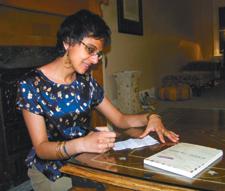There’s a new writer in town.
Salimah Valiani, a queer woman of colour, uses poetry to expose truths, confront unjust realities and bring people together.
Working as a coordinator for Toronto’s Colour of Poverty, a community-based organization that raises awareness about the racialization of poverty, Valiani works on her passion — poetry — in her off hours.
“I write and read every morning. My creative writing is the start of the day. It sets the tone,” says Valiani.
Letter Out: Letter In, her new collection, takes big-picture political analysis and searches for ways to “bring it back to the heart.”
Having started writing at the age of 10, poetry has always been an outlet for Valiani.
Letter Out: Letter In builds on lessons learned in the fight to end apartheid and a yearlong stay in post-apartheid South Africa.
“It gives a good reflection on the anti-apartheid movement: what we learned from that, what we’ve forgotten and what we can think of Canada through the lens of South Africa, 10 years after the death of apartheid,” says Valiani.
A researcher by trade — with a freshly minted doctorate in historical sociology — Valiani’s art and academic work are rooted in activism.
Raised by parents from East African countries — Tanzania and Uganda — Valiani quickly learned to see the world as political.
“I was taught that history as a child. I looked at the world through that kind of lens from a very young age. So, I knew the history of Canada as a colony, who we colonized and all the power dynamics of the world economy. Those have always been there, talks at the dinner table woven into how we hear world news today,” says Valiani.
At age 15, Valiani became part of the international anti-apartheid movement, joining thousands of students in Montreal in the 1980s to protest Canadian companies invested in South African businesses.
Valiani’s activism continued in Calgary, her place of birth, when writing in the mid-’90s for the now defunct queer publication Outword. She also became involved with The Fire I’ve Become, a queer film and video festival held in Calgary in 1995, organized by Of Colour: Lesbians, Gays and Bisexuals of Colour Calgary.
Travelling for study and work, Valiani had the opportunity to work as a researcher for an NGO in South Africa in 2004/2005 and see the place she helped change.
“What I observed in South Africa is people, in facing this one major state force, people came together, they broke down the divisions that were imposed on people and communities,” says Valiani.
Describing an example closer to home, Valiani recalls a magical time and place where no barriers existed, as a teen in Calgary.
“I used to hang at a place called Radio City. This was a place for queers, Native peoples, and any other reject in Calgary society used to hang at this bar. We felt like freaks. We felt like we didn’t belong. We had a place there, and we came to know each other in that space. That to me is an ideal now that I’d like to see made a reality in a huge queer community like the one in Toronto,” says Valiani.

 Why you can trust Xtra
Why you can trust Xtra


